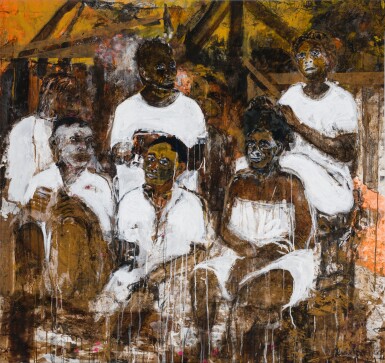The Norval Sovereign African Art Prize 2022 Benefit Auction | Hosted by Sotheby’s
The Norval Sovereign African Art Prize 2022 Benefit Auction | Hosted by Sotheby’s

NSAAP Public Vote Prizewinner
René Tavares
Sóia dona mu Retratos pra inglês ver serie
No reserve
Lot Closed
February 22, 05:18 PM GMT
Estimate
4,000 - 6,000 USD
Lot Details
Description
René Tavares
Sãotomense
b.1983
Sóia dona mu Retratos pra inglês ver serie
signed and dated 2021 (lower right); signed, titled and dated 2021 (on the reverse)
acrylic, charcoal, pigment, China ink on canvas
165 by 165cm., 65 by 65in.
This work has been kindly donated by the artist
René Tavares (b. 1983, Sao Tomé and Principe) is an artist whose work reflects on the African diaspora and the rhythms of communities that overlap time and place, and dilutes the watertight borders between domains. In creating work across a range of media, his practice reflects a personal experience of passages, exploring the threshold spaces between various artistic languages, between Africa and Europe, between the local and the global. Through questioning borders his work intends to awaken political awareness and social empowerment by creating a sense of restlessness, contained in visual artistic language.
Sóia dona mu Retratos pra inglês ver Serie is from the series Portraits for English to see and is the result of research that starts from archive photographs to painting. The title is based on an old Portuguese idiomatic expression "This is only for English to see!" (“para inglês ver”) that was originated around 1830 when England demanded Brazil make laws that prevented the slave trade. But those laws had little or no impact. Nowadays a “para inglês ver” project is one which, from the outside, appears to address a problem, but which in practice is merely a superficial change. For Tavares, it is about remembering the plantations in São Tomé and the period after the abolition of slavery. The workers were carefully prepared for inspection and forced to act out an illusory staging that perpetuated the maintenance of a system based on human exploitation. The basis of this work is to remind us of a historical past that it is important to recover and reckon with.
